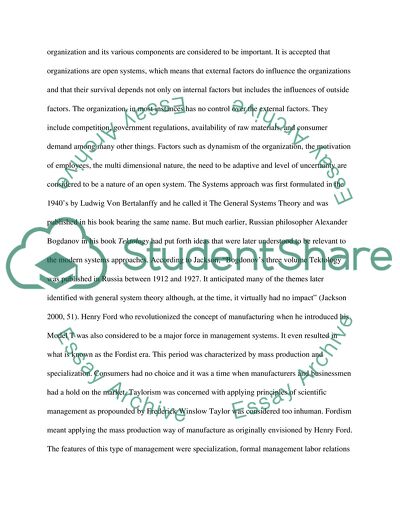
- Home
- Free Samples
- Premium Essays
- Editing Services
- Extra Tools
- Essay Writing Help
- About Us
- Studentshare
- Subjects
- Miscellaneous
- Discuss the evolution of the bureaucratic model from classic theories to managerial strategies
Discuss the evolution of the bureaucratic model from classic theories to managerial strategies - Essay Example

- Subject: Miscellaneous
- Type: Essay
- Level: Ph.D.
- Pages: 4 (1000 words)
- Downloads: 0
- Author: micahtowne
Extract of sample "Discuss the evolution of the bureaucratic model from classic theories to managerial strategies"
But in the 21st century, with more and more countries opening up their markets for international companies and size being considered very important to remain competitive, the role of management has become extremely complex. This paper looks at the evolution of the bureaucratic model from classic theories to managerial strategies. It wasn’t until the start of the Industrial revolution that serious studies on management and management behavior began to evolve. Well known among these were Frank and Lillian Gilberth and their time and motion studies, Max Weber known as the father of Modern Sociology, F W Taylor who was instrumental in increasing worker productivity through his studies on motion, Henry Fayol, Henry Gantt, Chester Bernard and Mary Parker Follett.
All the above theorists followed the Classical School approach (Management Schools). It was after 1950 that the human factor in an organization was thought to be of importance and this resulted in the evolution of human resources theories, systems theories, the concept of bureaucracy, and the contingency theories. Modern management theories like the systems theory emerged due to the inadequacy of the earlier theories to be applied on the organization as a whole. For example, the theory of F W Taylor concerns itself with production and has no real value in the administrative aspects of an organization.
But in the systems approach the organization and its various components are considered to be important. It is accepted that organizations are open systems, which means that external factors do influence the organizations and that their survival depends not only on internal factors but includes the influences of outside factors. The organization, in most instances has no control over the external factors. They include competition, government regulations, availability of raw materials, and consumer demand among many other things.
Factors such as dynamism of the
...Download file to see next pages Read More
- TERMS & CONDITIONS
- PRIVACY POLICY
- COOKIES POLICY